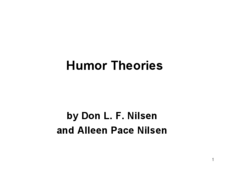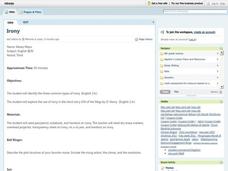Curated OER
Urban Legends
Irony, hyperbole, and other rhetorical devices are at play in this presentation about urban legends. Several examples of urban legends help to clarify the analysis, making it valuable for those who have a hard time wrapping their mind...
Curated OER
Literature and Humor
From Canterbury Tales to The Odd Couple, this presentation details the different treatments of humor in different literary formats. Numerous authors and works of literature are represented here as examples of satire, irony, comedy, and...
Curated OER
Humor Theories
Providing ample examples of humor in literature, psychology, and sociology, this presentation studies the concept and function of humor in society today. Covering what is classically "funny" and what is not, and why, the slideshow will...
Curated OER
Irony
Using examples from Socrates to Johnny Carson, this slideshow presents your students with the history and definition of dramatic irony, satire, situational irony, and tragic irony. This presentation would be useful in a language arts...
Curated OER
What is Figurative Language?
Need a review of literary terms and figurative language? Although text heavy, these slides clearly define frequently used terms and provide color-coded examples.
Curated OER
Literary Techniques
Need to review literary terms/techniques with your class? The slides in this presentation define and give examples of 22 common literary terms. The PowerPoint could be used for AP test prep.
Curated OER
The Tell-Tale Heart
Bring Edgar Allan Poe's spooky story to life! After reading the short story "The Tell-Tale Heart," middle and high schoolers identify the theme, character traits, irony, and other story concepts. During pre-reading, they take notes,...
Curated OER
Figures of Speech Quotes and Examples
Providing several examples of figures of speech, such as irony, paradox, and personification, this presentation could complement your lecture on pragmatic humor or humor in writing. Examples from Lewis Carroll's Alice's Adventures in...
Curated OER
Irony in Poetry and Prose (Fiction and Non-fiction Texts)
Middle and high schoolers examine the impact of irony in poetry and prose. In this figurative language instructional activity, they read instructor-selected literature and identify uses of irony. Then they discuss how irony enhances...
Curated OER
Irony
What are the three types of irony? High schoolers engage in a lesson about the use of irony while reading O.Henry's short story "Gift of the Magi." They'll discuss rising action, climax, and resolution in the text before highlighting the...
Curated OER
Academic Vocabulary
Arm your writers with an arsenal of literary terms. With definitions of everything from plot structure and figurative language to point-of-view and types of irony, learners will gain an understanding of elements in stories and be able to...
Curated OER
Gift of the Magi
While reading O Henry's "The Gift of the Magi," your class will define and identify situational irony and allusion. Use a study guide (not included, but easy to produce) to record and discuss examples of allusion as you read. Map the...
Curated OER
Editorial Cartoons
Do your classes love reading and drawing cartoons? Middle schoolers read an editorial cartoon from a newspaper. They discuss the cartoonist's topic, audience, and purpose. Next, they brainstorm questions they have about the cartoon and...
Curated OER
Semantic Gaps and Sources of New Words
The 44 slides in this power point presentation make visual the salient points in a college lecture to develop language and semantic awareness.
Curated OER
Speech Acts
See various examples of connotations in phrases and semantics. Speech acts are displayed along with their contexts and meanings.
Curated OER
Semantics
Use this PowerPoint in your college linguistics, English, psychology, or communications studies course. Not flashy, this presentation is still full of high-level concepts and vocabulary regarding semantics and verbal ambiguities, irony...
Curated OER
What is Language?
Intended to be used along with the first chapter of An Introduction to Language textbook, this PowerPoint is full of linguistic terminology that is not necessarily explained. This tool can be used to complement a lecture or a text, but...
Curated OER
Irony
You will want to listen to the famous song, "Ironic," by Alani Morissette, after viewing this short PowerPoint. The three slides in this slideshow include a definition of irony, verbal irony, and dramatic irony. Tip: Ask your class to...
Curated OER
Sarcasm
Learners often regard sarcasm as a "you know it when you see it" language phenomenon, leading to confusing tone and humor in student writing. This presentation not only defines sarcasm (and irony) in plain terms, it also provides many...
Curated OER
"how I Edited an Agricultural Paper Once"
Students identify the point of view of the story. They describe tone of story using at least 3 examples and describe satire and provide at least 3 examples. They identify and describe at least 3 examples of irony and write and share a...
Curated OER
Literature: Satire in the American Dream
Eleventh graders examine cartoons for examples of satire, irony, and sarcasm. They write essays about cartoons, art work, or literature analyzing it for satirical elements. Finally, they create their own piece in one of the three areas...
Curated OER
Analyzing Irony in Nonfiction
Students examine the use of irony in non-fiction works. In this literature lesson, students read non-fiction war texts and explore the use of irony in the piece as they respond to discussion questions.
Curated OER
Understanding Irony
Students discuss irony. For this language arts lesson, students identify irony and give examples of irony from their lives, a book, and current events. Students classify types of irony.
Curated OER
Identifying Irony
In this identifying irony activity, 9th graders read 6 paragraphs, identify the type of irony being used (dramatic, situational, verbal) and explain their answer.

























